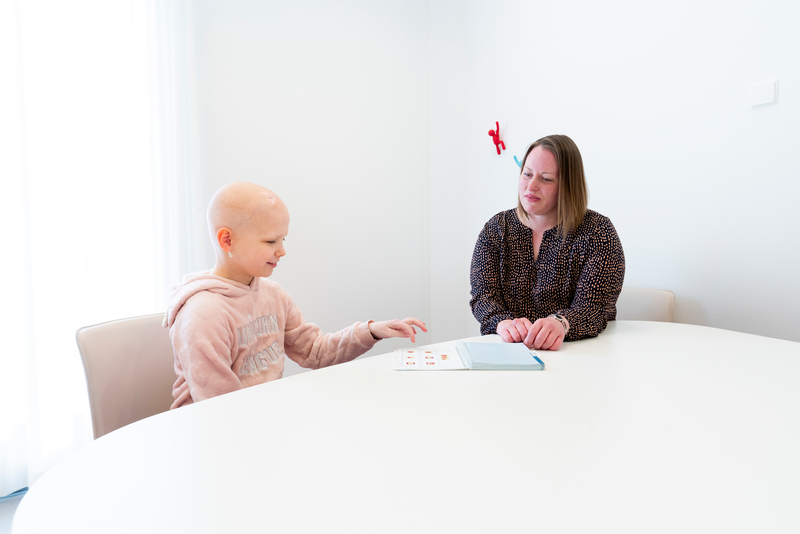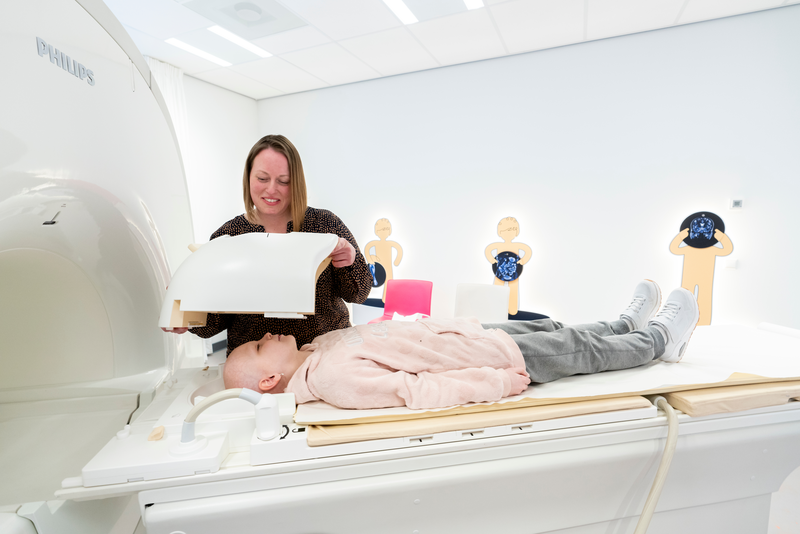Group leader: Dr. Marita Partanen

Advances in treatment have led to increased survival rates for children with cancer. However, more than 50% of brain tumor survivors and 20-30% of leukemia, lymphoma, or solid tumor survivors can develop neuropsychological impairments. This may include changes in cognition, behavior, or social-emotional functioning during or after treatment. With our research, we aim to improve the early identification and intervention of these impairments in patients and survivors of childhood cancer. We bring together cognitive and biological approaches in close collaboration with care colleagues, with the ultimate aim of helping to prevent further neuropsychological difficulties and improve quality of life in this group of children.
Monitoring
The ability to monitor or screen for neuropsychological difficulties at an early phase is essential for providing timely supports. One aim of our research is to identify these impairments using a cognitive screening battery in various patient groups. We also work closely with our care colleagues to implement a neuropsychological monitoring program for children with brain tumors (called the Brain CARE program).
Risk and protective factors
Young age at diagnosis and cranial irradiation treatment are often associated with poorer neuropsychological outcomes. Another aim of our research is to identify novel risk and protective factors in pediatric cancer groups (e.g., demographic, treatment, complicating factors). This information will allow clinicians to provide supports to those patients who are considered highest risk for poor neuropsychological outcome.
Biomarkers
Biomarkers of outcome, such as with brain imaging, can provide further information about those who are at highest risk for neuropsychological problems. One area of our research is to examine whether vascular, structural, or functional changes in the brain are associated with neurocognitive functioning in patients with cancer.
Interventions
There are some groups that are at highest risk to develop neuropsychological impairments, such as children with brain tumors or those who receive cranial radiation. Despite this knowledge, there are few evidence-based interventions to prevent or rehabilitate neuropsychological deficits for these children. One of our research aims is to explore early intervention strategies for these high-risk groups.
Grants
- ALL Together BRAIN: Neurological and psychosocial determinants of neurocognitive outcome in pediatric acute lymphoblastic leukemia, together with Prof. Christina Halsey and Prof. Arja Harila
- The HERCules Project; Hypothalamic damage in pediatric brain tumor survivors: Effects of Radiotherapy and associations with Cognitive functioning. With Dr. Hanneke van Santen and Dr. Geert Janssens - KiKa research grant 2023.
- FASTigial study: Finding Anatomical SubsTrates of neuropsychological outcome in children with posterior fossa tumors with Dr. Kirsten van Baarsen and Dr. Maarten Lequin - KiKa research grant 2022.
- SIMBA study: Vascular and metabolic profiles on 7TMRI and relationships with neurocognitive functioning in pediatric posterior fossa tumors with Dr. Jannie Wijnen - KiKa Pilot grant 2022.
- ERNIE study: Family-centered and personalized neuropsychological intervention to improve daily functioning for children with brain tumors with Prof. Dr. Martha Grootenhuis, Dr. Rachèl Kemps, Dr. Jeanine Voorman, Dr. Femke Aarsen, Raphaele van Litsenburg - KWF Young Investigator Grant 2022.
- Risk and protective factors for neuropsychological outcome in pediatric cancer - EU Butterfly program 2022 ( https://maximabutterfly.com/).
Princess Máxima Foundation - Donations are regularly received through Princess Máxima Center Foundation to support our work for development of a young child program, which is a combined effort between research and care departments.
Awards - 2021 PhD Co-Supervisor of the Year Award, Utrecht University (Dr. Partanen)
- 2020 Dr. Jon Pritchard Award, The Nikolas Symposium for Langerhans Cell Histiocytosis (Dr. Partanen)
- Huisman, M.H., Sanstra, S., Bos, D.P.A., Haveman, L.M., Grootenhuis, M.A., Aarsen, F.K., & Partanen, M. (2025). Neuropsychological performance and its predictors in the early treatment phase of non-CNS pediatric cancer. Pediatric Blood & Cancer, doi:10.1002/pbc.31659
- van der Plas, M.C.E., van der Voort, E.C., Wijnen, J.P., Partanen, M., & Zwanenburg, J.J.M. (2025). Feasibility of single-shot multi-slice DENSE MRI at 7T for strain tensor imaging in a pediatric population. Interface Focus. doi:10.1098/rsfs.2024.0047
- Obdeijn, I.V., van Baarsen, K.M., Avula, S., Toescu, S., Lequin, M.H., Hoving, E.W., & Partanen, M. (2024). Neuroimaging of post-operative pediatric cerebellar mutism syndrome: a systematic review. NeuroOncology Advances. doi:1093/noajnl/vdae212
- Kremer-Hooft van Huijsduijnen, E.A.B., Greidanus-Jongejan, J.E.M., Grootenhuis, M.A., van Litsenburg, R.R.L., Aarsen, F.A., Franke, N.E., de Vos-Kerkhof, E., & Partanen, M. (2024). Posttraumatic stress, sleep, and neurocognitive problems in children newly diagnosed with a pediatric brain tumor. Journal of Clinical and Experimental Neuropsychology. doi:10.1080/13803395.2024.2426621
- Leenders, A.E.M., Kremer-Hooft van Huijsduijnen, E., Robalo, B., van Male, R., De Luca, A., Kemps, R., Hoving, E., Lequin, M.H., Grootenhuis, M.A., & Partanen, M. (2024). Unraveling the relations between post-traumatic stress symptoms, neurocognitive functioning and limbic white matter in pediatric brain tumor patients. Neuro-Oncology Advances, vdae026, doi:10.1093/noajnl/vdae026
- Kuil, L.E., Varkevisser, T.M.C.K., Huisman, M.H., Jansen, M., Bunt, J., Compter, A., Ket, H., Schagen, S.B., Schouten-van Meeteren, A.Y.N., Partanen, M. (2024). Artificial and natural interventions for chemotherapy- and/or radiotherapy-induced cognitive impairment: a systematic review of animal studies. Neuroscience and Biobehavioral Reviews, 157, 105514. doi:10.1016/j.neubiorev.2023.105514
- Freer, C., Gefen, N., Gonzalez, I., Kemps, R., Partanen, M., Colbert, A. (2023). Cross-cultural collaborative translation/adaptation of assessments via international consulting groups: a case study with the Cognitive and Linguistic Scale. International Perspectives in Psychology: Research, Practice, Consultation. doi:10.1027/2157-3891/a00009
- Aarsen, F., van Veelen-Vincent, M., Partanen, M., & Catsman-Berrevoets, C. (2022). Peri-operative risk factors for long term intelligence in children with postoperative cerebellar mutism syndrome after medulloblastoma surgery. Pediatric Blood & Cancer, 69(3): doi:10.1002/pbc.29536
- Partanen, M., Anghelescu, D.L., Hall, L., Schreiber, J.E., Rossi, M., Gajjar, A., & Jacola, L.M. (2021). Longitudinal associations between exposure to anesthesia and neurocognitive functioning in pediatric medulloblastoma. European Journal of Cancer, 148, 103-111. https://dx.doi.org/10.1016/j.ejca.2021.02.010
- Partanen, M., Phipps, S., Russell, K., Anghelescu, D.L., Wolf, J., Conklin, H.M., Krull, K.R., Inaba, H., Pui, C.H., & Jacola, L.M. (2021). Latent longitudinal trajectories of neurocognitive functioning in childhood survivors of acute lymphoblastic leukemia. Journal of Pediatric Psychology, 46, 168-178. https://dx.doi.org/10.1093/jpepsy/jsaa086
- Partanen, M., Kang, G., Wang, W.C., Krull, K., King, A.A., Schreiber, J.E., Porter, J.S., Hodges, J., Hankins, J.S., & Jacola, L.M. (2020). Association between hydroxycarbamide exposure and neurocognitive function in adolescents with sickle cell disease. British Journal of Haematology, 189, 1192-1203. https://dx.doi.org/10.1111/bjh.16519
- Partanen, M., Bouffet, E., Laughlin, S., Strother, D., McConnell, D., Hukin, J., Skocic, J., Szulc-Lerch, K., & Mabbott, D.J. (2018). Early changes in white matter predict intellectual outcome in children treated for posterior fossa tumors. NeuroImage Clinical, 20, 697-704. https://doi.org/10.1016/j.nicl.2018.09.005















